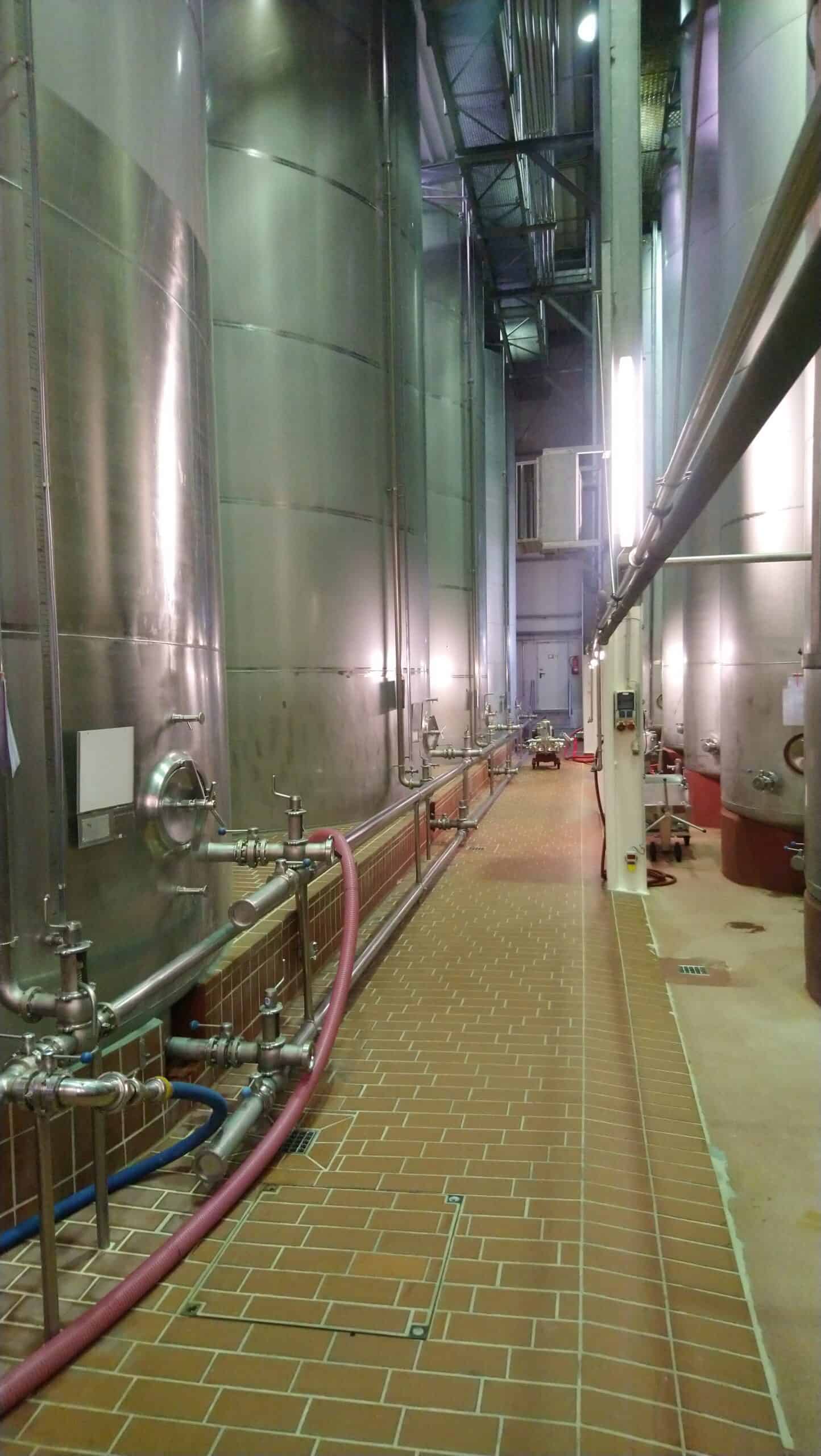- Wines matured in the leading wine-growing countries (France, Spain, Italy and Germany) and processed in Bremen according to Breko standards.
- Primary use for flavouring food.
- Typical applications: Soups, sauces, convenience products, ice cream, desserts, confectionery and mixed beverages containing wine.
- Delivery EU-wide in disposable jerrycan (10, 25 litres), in 1000 litre disposable IBCs or in tankers (15,000 to 25,000 litres).
| 0531 | White wine, dry | 9,5 % vol, EU |
| 0533 | White wine, dry | 11 % vol, EU |
| 0535BIB | Riesling, dry | 11 % vol, Germany, 10 litre bag-in-box |
| 0538 | Chardonnay | 12 % vol, Italy |
| 0542 | White wine, Sherry type | 14 % vol, Spain, 5 litre bag-in-box |
| 0524 | Red wine | 10 % vol, EU |
| 0782 | Pinot noir, red | 12 % vol, Germany, in 25 litre canister or 1000 litre IBC |
| 0545BIB | Merlot, red | 13 % vol, France, 3 litre bag-in-box |
Further liqueur wines are available on request.
- Liqueur wine is a wine to which a distilled spirit is added. The added alcohol stems exclusively from grapevine products or a variety of wine products (brandy, pomace brandy, etc.).
- Typical applications: Soups, sauces, convenience products, ice cream, desserts and confectionery.
- Fortified wines are also used as the basis for the production of pharmaceutical tonics.
- Delivery EU-wide in disposable jerrycan (10, 25 litres) and in 1000 litre disposable IBCs.
| 3591 | Liqueur wine, red | 15 % vol, 200 g/l sugar, EU |
| 3592 | Liqueur wine, red | 15,5 % vol, 140 g/l sugar, EU |
| 3668 | Liqueur wine, pale | 15 % vol, 140 g/l sugar, EU |
| 3612 | Liqueur wine, pale | 16,5 % vol, 120 g/l sugar, EU |
| 3681 | Liqueur wine, dark | 18 % vol, 150 g/l sugar, EU |
| 3689 | Liqueur wine, dark | 16,5 % vol, 120 g/l sugar, EU |
| 3691 | Liqueur wine, dark | 15 % vol, 200 g/l sugar, EU |
| 3552 | Malaga | 15 % vol, 200 g/l sugar, Spain (condiment) |
| 3553 | Cream Sherry | 17,5 % vol, Spain (condiment) |
| 3554 | Sherry Fino | 17 % vol, Spain (condiment) |
| 3555 | Sherry Medium | 17,5 % vol, Spain (condiment) |
| 3556A | Madeira, pale, without caramel colouring | 17 % vol, Portugal (condiment) |
| 3563 | Marsala Fine, DOC | 17 % vol, Italy (condiment) |
| 3557S | Port wine, red, salted | 19 % vol, Portugal (condiment with 0,5 – 0,7 % salt) |
Further liqueur wines are available on request.
- Aromatised wines are produced from wine, grape juice and alcohol.
- Aromatisation can only be done using natural flavouring and/or natural flavouring extracts.
- The characteristic flavour of vermouth is due to the use of wormwood (Artemisia absinthium). Cremovo is a wine that contains egg yolk and aromatic herbs.
- Delivery EU-wide in disposable jerrycan (10, 25 litres) and in 1000 litre disposable IBCs.
| 3568 | Cremovo without vanilla and coloring caramel | 15 % vol, Italy |
| 3562 | Vermouth, white | 15 % vol, 140 g/l sugar, Italy |
- The high quality Breko winter wines are produced exclusively from Spanish or Italian wines. These are characterised by a fruity, strong, full-bodied but not too sweet taste. The red winter wines have a very intense colour.
- The Breko mulled wines are produced in Bremen based on our in-house recipes using exclusively natural flavouring. The wine content is over 90 % which is 40 % above the legal requirements.
- The mulled wines are supplied ready-to-use, whereas the red wine punch is typically finished off by the client with rum (e.g. fairgrounds and winter markets). If required, red wine punch can also be supplied already containing rum.
- Delivery EU-wide in disposable jerrycan (10, 25 litres) and in 1000 litre disposable IBCs. The Breko own brand “Rosi Glüh” is also available in 3 litre bags.
| 0511 | Mulled wine (“Glühwein”), red wine based | 9,5 % vol, 80 g/l sugar, EU |
| 0517 | Mulled wine (“Glühwein”), white wine based | 9 % vol, 70 g/l sugar, EU |
| 0513 | Red wine punch (“Feuerzangenbowle”), red | 9,5 % vol, 70 g/l sugar, EU |
| 0511Rosi | Rosi Glüh | 9,5 % vol, 80 g/l sugar, EU |
We refer to (EU) Directive no. 251/2014 for a detailed definition of aromatised wine products.
- Spirits are alcoholic beverages produced by distillation of natural plant products, such as fruits, vegetables or grain.
- Typical applications: Soups, sauces, convenience products, desserts and confectionery.
- Delivery EU-wide in disposable 10 litre jerrycan.
| 3150 | Cognac | 40 % vol, France, in 25 litre jerrycan |
| 3187 | Blended Whiskey | 40 % vol, EU |
| 3195 | Gin | 37,5 % vol, Germany |
| 3196 | Brandy without coloring caramel | 36 % vol, 6 months matured, EU |
| 3301 | Rum | 40 % vol, brown |
| 3302 | Rum | 52 % vol, brown |
| 3312 | Orange liqueur | 40 % vol, triple sec, France |
| 3317 | Calvados | 40 % vol, 2 years matured, France |
Further spirits are available on request.
- Wine concentrates are produced from French red and white wines by removing the alcohol and concentrating them under vacuum and form a non-alcoholic and more flavourful alternative to wine (alcohol content < 0.5 % vol).
- Typical application: Soups, sauces, ready meals, marinades, beverages and confectionery.
- Declaration: Red wine or white wine, de-alcoholised concentrate.
- Delivery EU-wide in 10 kg bag-in-box, disposable 25 litres jerrycan or IBC containers.
| 705 | French red wine concentrate | 1 kg is equal to 35 l of wine, strong red wine note, produced from the grape varieties Merlot, Syrah, Carignan, Grenache, Cabernet and Alicante |
| 715 | French white wine concentrate | 1 kg is equal to 38 l of white wine |
| 703 | Red wine concentrate | 1 kg is equal to 7l of red wine |
| 702 | White wine concentrate | 1 kg is equal to 7l of white wine |
| 701B | Red wine concentrate, sweet | 60 % French red wine concentrate, 40 % red grape juice concentrate, 10 kg bag-in-box |
- Wine powders are produced from French and Italian red and white wines by removing the alcohol and concentrating them under vacuum, with subsequent spray drying.
- The wine powders form an alcohol-free alternative (alcohol content < 0.5 % vol) to wine for use in dry foods.
- Typical applications: Soups, sauces,ready meals, marinades, instant beverages and confectionery.
- Delivery EU-wide in 1 kg container (Art.No. 812), in 15 kg container (Art.No. 800) and in 25 kg container (Art.No. 801, 811, 812).
| 800 | Red wine powder WE10 | 10 % dry matter of red wine |
| 801 | Red wine powder WE20 | 20 % dry matter of French red wine |
| 812 | Red wine powder WE100 | 100 % dry matter of French red wine |
| 810 | White wine powder WE10 | 10 % dry matter of white wine |
| 811 | White wine powder WE20 | 20 % dry matter of French white wine |
- The liquid wine flavours serve the purpose of aromatisation of foods, e.g. beverages and confectionery, and confer the typical wine top notes to the end product.
- A wide range of varietal wine flavours is available on request.
- The liquid spirit concentrates flavours serve the purpose of aromatisation of foods, e.g. beverages and confectionery.
- Various spirit flavours (whisky, tequila, gin, vodka, rum) on request.
| 962L | Coriander concentrate, natural | Solvent: 89-93 vol % ethanol; Dosage: 1 ml/l |
| 963L | Juniper concentrate, natural | Solvent: 93-97 vol % ethanol; Dosage: 1 ml/l |
- Oak wood extracts are natural ethanolic or aqueous extracts from American or French oak.
- Typical applications: Spirits, sauces and marinades.
| 960L | American oak extract, alcohol-based | Solvent: 38 – 42 % vol ethanol |
| 961L | American oak extract, Premium type, alcohol-based | Solvent: 39 – 43 %vol ethanol |
| 964L | French oak extract, Premium type, alcohol-based | Solvent: 38 – 43 % vol ethanol |
| 965VFN | French oak extract, water-based | Untoasted, strong oak aroma, vanilla, fruity notes |
| 965FN | French oak extract, water-based | Medium toasted, strong oak aroma, fruity notes |
| 965STC | French oak extract, water-based | Strong toasted, oak aroma, caramel |
| 965OCV | American oak extract, water-based | Light toasted, oak aroma, caramel, vanilla |
- Grape juice concentrates are made of red or white grape juice through vacuum distillation and concentration.
- Delivery EU-wide in 270 – 285 kg drums.
| 820 | Red grape juice concentrate | 4 kg grape juice is equal to 1 kg grape juice concentrate; Brix: 63 – 66 °Brix |
| 821 | White grape juice concen- trate | 4 kg grape juice is equal to 1 kg grape juice concentrate; Brix: 63 – 66 °Brix |
- FructiSweet Original™ fruit sweeteners are made from grape and date fruit juice concentrates and are processed into neutral tasting fruit sweeteners by physical methods.
- These products are made from 100 % fruit and have a better image with the consumer than the classic crystalline sugar, which is usually made from sugar beet or sugar cane.
- Typical applications are fruit juice drinks, carbonated drinks / soft drinks, functional drinks, sports and energy drinks, tea drinks, dairy products (fruit sweeteners are deacidified, therefore ideal for dairy products), ice cream, confectionery, syrups, jams, spirits / fruit wines, sauces (e.g. ketchup) .
- Delivery EU-wide in disposable 25 kg jerrycan, 250 drums and 1325 kg IBC containers.
| 826CJRD | FructiSweet Original™ Grape | 100 % grapes, dry matter: 65 ± 2 g/100 g; fructose: 48-52 %, glucose: 48-52 %, sucrose: 0 % |
| 826FSOD | FructiSweet Original™ Date | 100 % date, dry matter: 68 ± 2 g/100 g; fructose: 43-52 %, glucose: 46-56 %, further sugars: 0-4 % |
| 826FS50 | FructiSweet™ 50 Mix | 100 % fruit, dry matter: 65 ± 2 g/100 g; fructose: 45-55 %, glucose: 45-55 %, sucrose: ≤ 2 %; polyols: ≤ 5 % |
For organic products: DE-ÖKO-003
- Grape colourants are obtained from the red wine grape skin through aqueous extraction and used as colourants in the food industry. The hue of the colour of grape extracts is pH-dependent. The hue is red in acidic formulations and violet-blue in alkaline formulations.
- These extracts are a natural alternative to artificial red food colourants. The grape skin extracts in the end product are to be declared as anthocyanins, E163.
| 822S | Red grape skin extract, liquid | Colour strength: 2,85 – 3,15; Halal certified by HFCE |
| 825F | Red grape skin powder | Colour strength: 11,4 – 12,6; Halal certified by HFCE |
- Grape tannins are extracts from white grape skins or grape seeds and their uses include the stabilisation of the red wine colour and improvement of the wine structure. Their use in the treatment of wine is permitted pursuant to the OIV [International Organisation of Vine and Wine].
- Grape tannins used as functional ingredients create a bitter taste, higher complexity and astringency.
| 850F | Grape skin tannin powder | > 65 % tannins with high molecular weight |
| 851F | Grape seed tannin powder | > 65 % tannins with low molecular weight |


